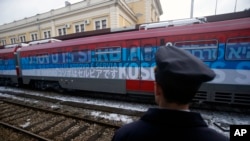Kosovo's foreign minister has written to his counterparts in the European Union, U.S. and other countries denouncing “numerous acts of provocation and aggression” from Serbia, an official said Thursday.
The minister, Enver Hoxhaj, called on the EU, which facilitates Pristina-Belgrade talks to normalize ties, “to urge Serbia to remain committed to good neighborly relations,” according to the official.
“The Republic of Kosovo encourages the European Union ... to urge Serbia to remain committed to good neighborly relations and regional cooperation and not interfere in the domestic affairs of other countries or take provocative actions which aim for the destabilization of the region,” the minister said in a three-page letter.
The official spoke anonymously because he wasn't authorized to publicly comment on the letter. He didn't explain how and which countries were chosen, only mentioning “EU, U.S. and other countries.”
Kosovo-Serbia relations reached a crisis moment last weekend when a Serbian train, bearing signs reading “Kosovo is Serbia” and decorated in the colors of the Serbian flag and Christian Orthodox symbols, was turned back from the border with Kosovo.
Hoxhaj considered the last incident with the train as “the last event in the chain of aggressive and provocative acts that Serbia has undertaken against the sovereignty and territorial integrity of the Republic of Kosovo."
The minister mentioned that earlier in January, Ramush Haradinaj, a former Kosovo prime minister and a former guerrilla commander in Kosovo's 1998-1999 war for independence from Serbia, was detained in France as Serbia demanded his extradition to face war crime charges. Pristina says Haradinaj has twice been cleared of such charges by a U.N. tribunal.
In December, the Serb ethnic minority in Mitrovica put a concrete wall on the northern part of the bridge on Ibar River, calling it a technical support barrier against a landslide. Kosovo protested, and its parliament voted to demolish the wall.
Hoxhaj said that Pristina has “acted with political maturity and in full accordance with domestic and international rules when countering Serbia's hybrid threats through peaceful dialogue and diplomatic methods.”
Kosovo declared independence from Serbia in 2008, but that hasn't been recognized by Belgrade.
Serbia, backed by Russia, has sought to maintain influence in Kosovo, especially in the north where most of the country's Serb minority lives. NATO-led troops have controlled Kosovo's territory since a three-month air war in 1999 to stop a bloody Serbian crackdown against ethnic Albanian separatists.
Kosovo Asks EU, US and Others to Denounce Serbia 'Provocation'

PRISTINA —



